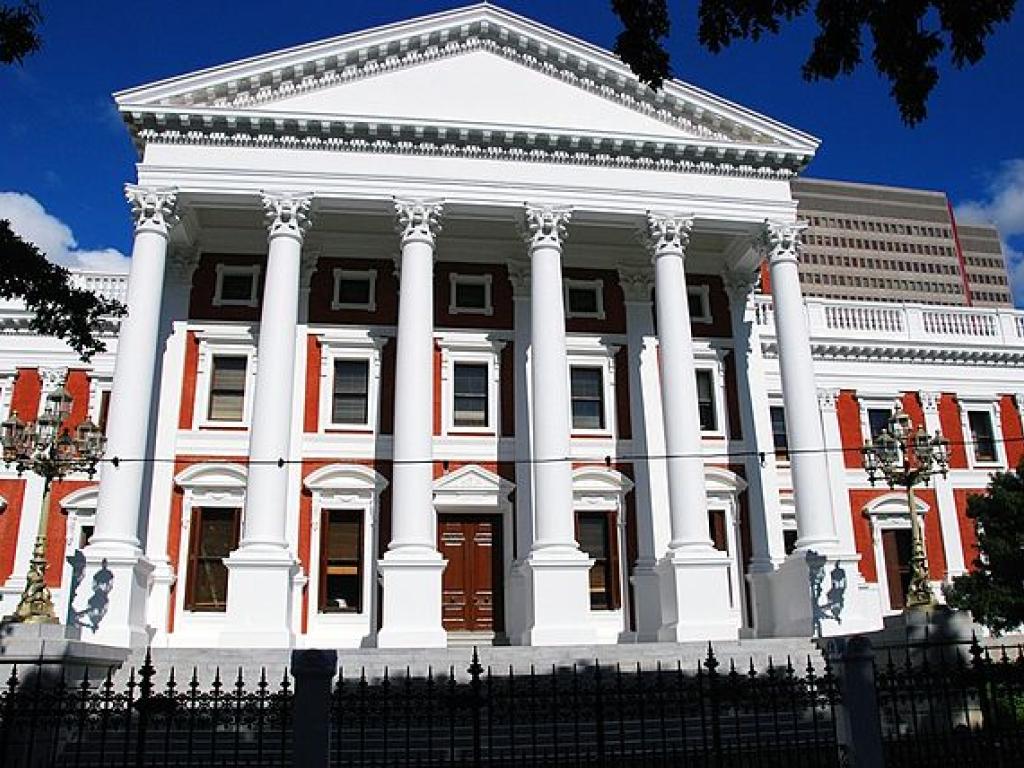A debrief of the Department of Environmental Affair’s budget vote

By Alex Brown, ACDI masters class of 2015 and fundraising officer for the Adaptation Network
Alicia Okeyo (Research and M&E Officer at the African Climate & Development Initiative) and I (Fundraising Officer at the Adaptation Network) attended the tabling of the Department of Environmental Affairs budget vote at Parliament in Cape Town on 25 May 2017. We were at Parliament to hear what Minister Edna Molewa intended to spend the DEA’s money on in the 2017/2018 period.
Recently there have been a number of events in the lead up to this budget speech which should influence the DEA’s expenditure. Briefly, those events are: South Africa’s commitment to the Paris Agreement in 2016, the recent World Economic Forum annual meeting in Switzerland and the African World Economic Forum held in Durban this year. Added to this, the Green Climate Fund has given SANBI and the SA Development Bank implementing agency accreditation.
These big events highlight the links between the environment, sustainable socio-economic development and international policy (that trickles down to national policy).
Specifically, what we wanted to hear from Minister Edna Molewa’s speech was how ‘climate change’ would be prioritised and if funding would be ramped up to support organisations taking on adaptation and mitigation initiatives.
My new role with the Adaptation Network (in partnership with ACDI) is to develop a fundraising strategy going forward. The last three months have been literature intensive, while I learn where the money is and how we can access it. The main thing I’ve learnt is: SANBI and the government have the money in South Africa for climate change initiatives. I haven’t totally figured out how to get it yet. So, in proactive style I marched off with Alicia to Parliament to hear first-hand what the minister had to say.
Alicia and I never made it into the assembly hall where Minister Molewa had begun speaking because all the seats had been taken. The room was full of suits and SANParks officials. So we stood dumbfounded for a bit and wondered why we wasted 2 hours trying to be proactive. Then we left, walking past two BMW i3 cars that the DEA had on display for the media. Parliament is a whole new ball game, and we simply weren’t ready.
This morning I scanned through the Minister’s speech to see what we missed. This is what the DEA is focusing its budget on:
The DEA will take on a three pronged approach to facilitate a long-term transformative pathway that encompasses green growth and development that is inclusive, just, sustainable, low carbon and climate resilient. Guided by the Sustainable Development Goals, this approach conserves nature while building on socio-economic development simultaneously and sustainably, in line with the National Development Plan. The approach is as follows:
1) Phakisa Approach (planning and supporting the green economy):
Accelerating green economy opportunities with focus on SMMES, waste recycling and an ocean and biodiversity economy (eco-tourism).
2) The Environmental Justice Approach (Enhancing the regulatory system):
Reviewing of the legislation and improving enforcement, with focus on: climate change (including national measures to action our Paris Agreement commitment), chemicals, waste, biodiversity and conservation.
3) The Economy-Wide Service Delivery Approach (Implementation and investment):
Comment on the National Green Fund was that the government has allocated R1.2bn to the fund and created approximately 6 620 jobs. Molewa states that the onus is not only on the government to create new green jobs, but on the private sector and partnership building internationally and locally. Hence the following actions:
- The DEA has become a member of the Partnership for Action on Green Economy (PAGE) and the Switch Africa Green partnership, which explores ways to implement sustainability in the economic sector.
- The DEA is also working with SANParks to develop eco-tourism as a way to draw international investment.
- Engagement with the United Nations Environment Assembly, GEF and GCF (where Zaheer Fakir serves as a developing country chair to the Board).
- Promotion of the Development Bank of SA and SANBI as accredited entities, through which we can access international climate and development funding (this is where we tap into climate change adaptation funding, where mitigation funding has many other financing mechanisms).
- Develop stronger cooperation with the SADC and African Union that helps to strengthen south-south cooperation.
While there is still a strong mitigation approach to how the DEA is addressing climate change and environmental development, adaptation has been recognised:
“We will finalise South Africa’s National Climate Change Adaptation Strategy, which sets out programmes for responding to expected climate change impacts on our economy, society, and environment.”
No financial numbers were attached to the speech, and no weighted prioritisation was applied either. But, we know that if we want to secure funding from the government for adaptation and mitigation initiatives - then we need to highlight clearly the connectedness between our respective activities, the SDGs and how this applies to greening the South African economy and benefiting society. It is integral that we focus more on developing partnerships across borders - ideally establishing south-south cooperation.
These are exciting times with new dynamic financing mechanisms becoming available to tackle climate change impacts. Currently the GCF has a total of US$10.3bn locked in its stores (announced and signed pledges). We can only wait for those funds to start flowing. In the meantime, it is useful to know now that the DEA is focusing strongly on a green economy as we prepare our applications for future funding.
Alicia and I also noted that it is good to take a proactive role in fundraising.